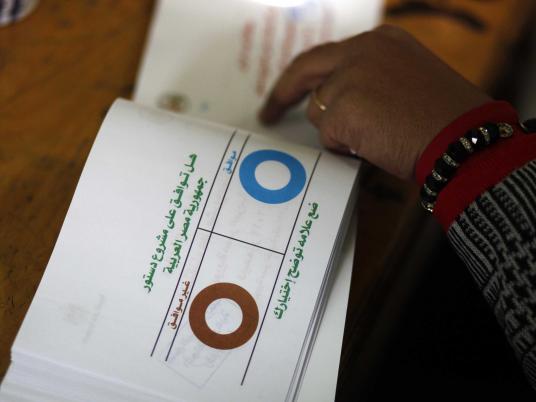
According to official figures announced so far, 75 percent of expatriate Egyptians residing in Western and non-Gulf Arab countries have rejected the constitution.
However, this result may be largely offset by expat Egyptian voting in Gulf Arab countries, where many commentators project an overwhelming “yes” vote.
So far, 21 Egyptian embassies and consulates around the world have completed their vote-counting. According to statistics compiled by Egypt Independent, 64,773 expatriate Egyptians have voted in the referendum, of whom 45,355, or 70 percent, voted in favor of the constitution and 18,923, or 30 percent, voted against it.
Jeddah contributed the largest share of “yes” votes, with 36,203, or 81.55 percent, voting in favor of the constitution and 8,192, or 18.45, voting against it.
Egyptians voting in Jeddah outnumber the total of expatriate votes in Western countries whose results have been announced.
In non-Gulf Arab countries, the pattern has been for Egyptians to reject the constitution. In Algeria, Ezz Eddin Fahmy, the Egyptian ambassador, said that out of a total of 305 valid votes, 193 voters, or 63 percent, rejected the constitution. However, in Libya, 168 people said yes to the constitution while 168 said no.
So far, Italy is the only Western country where the majority of expats have voted in favor of the constitution. In Italy, 36 percent of eligible voters participated in the referendum, with 1,165 voting in favor of the constitution and 1,039 rejecting it.
In France, 1,366 Egyptians rejected the new constitution, while 834 approved the constitution.
Out of a total of 6,225 registered voters in Britain, 3,014 voters, almost half of eligible voters, went to the polls. Of the total number of Egyptians who voted, 2,067 voted against it and 934 voted in favor of it. Five of the total votes were invalid.
In the US, only the Egyptian Embassy in Washington DC had recorded results so far, with 1,682 voters saying “no” to the constitution, while 691 people voted “yes.” Of the total voters, 70.88 percent rejected the constitution, while 29.12 endorsed it.
Of 1,981 eligible voters in The Netherlands, 951 participated in the referendum. Khaled al-Abyad, Egyptian consul in The Netherlands, said 526 people, or 67 percent of voters, rejected the constitution, while 216, or 33 percent, voted in favor of it. All votes were correct.
In Belgium, of a total of 638 eligible voters, 281 people cast their votes in the referendum. Of that total, 177, or 68 percent, rejected the constitution and 104, or 42 percent, endorsed it. Only three votes were invalid.
In Switzerland, 454 people rejected the constitution and 129 voted in favor of it.
Of a total of 3,113 eligible voters in Germany, only 17.42 voters participated. Seven hundred voters, or 77.66 percent, rejected the constitution, and 533, or 23.43 percent of voters said yes.
Out of a total of 1,510 eligible voters in Austria, 598 went to the referendum. And of those, 256 voted in favor of the constitution while 314 voted against it.
In Greece, 551 people, or 73.4 percent, voted against the constitution, and 189, slightly more than a quarter of the valid votes, voted in favor of it. Ten votes were invalid, and 750 Egyptians voted out of a total of 2,790 registered voters.
Out of a total of 162 registered voters in Tunisia, 82 went to the referendum. Sixty-six voters, or 81 percent, said no to the constitution and 16, or 19 percent, said yes. All votes were correct.




